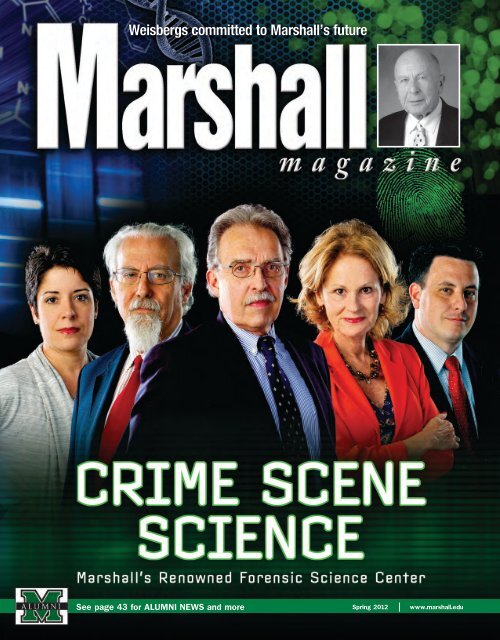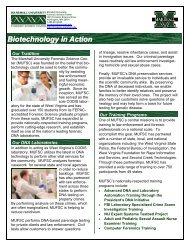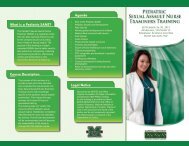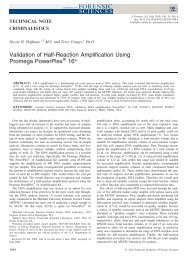Cover Story - Marshall University Forensic Science Center
Cover Story - Marshall University Forensic Science Center
Cover Story - Marshall University Forensic Science Center
Create successful ePaper yourself
Turn your PDF publications into a flip-book with our unique Google optimized e-Paper software.
Weisbergs committed to <strong>Marshall</strong>’s future<br />
See page 43 for ALUMNI NEWS and more<br />
Spring 2012 www.marshall.edu
cover story<br />
4 SPRING 2012
<strong>Marshall</strong>’s renowned<br />
<strong>Forensic</strong> <strong>Science</strong> <strong>Center</strong><br />
offers areas of emphasis in<br />
Crime Scene Investigation,<br />
Digital <strong>Forensic</strong>s, DNA<br />
Analysis and <strong>Forensic</strong><br />
Chemistry.<br />
Premiering on CBS television in 2000, CSI: Crime<br />
Scene Investigation follows crime analysts as they<br />
use DNA and other scientific evidence to solve<br />
grisly crimes. The show has become the mostwatched<br />
TV drama in the nation and has inspired two<br />
spin-offs and a host of copycats. It should surprise no<br />
one that CBS has renewed CSI for a 13th season.<br />
And it’s perhaps not surprising, too, that more and<br />
more young people are eyeing forensic science as a<br />
career, making it one of the hottest subjects on today’s<br />
campuses. According to USA Today, more than 130 of<br />
the nation’s college and universities now offer forensic<br />
science programs. However, the newspaper notes<br />
that only a handful of those programs are accredited.<br />
By James E. Casto<br />
Photos by Rick Lee<br />
SPRING 2012 5
Cutline cutline cutline<br />
The <strong>Marshall</strong> <strong>Forensic</strong> <strong>Science</strong> <strong>Center</strong> works with the West Virginia State Police to compile a database of criminal offenders using<br />
DNA samples. The DNA profiles created in the <strong>Marshall</strong> laboratory are also forwarded to the FBI for inclusion in a national database.<br />
Among them are the programs at the <strong>Marshall</strong><br />
<strong>University</strong> <strong>Forensic</strong> <strong>Science</strong> <strong>Center</strong>.<br />
<strong>Marshall</strong>’s programs actually pre-date the debut of<br />
CSI. The school accepted its first class of forensic science<br />
students in 1995. Since then, the MU <strong>Forensic</strong><br />
<strong>Science</strong> <strong>Center</strong> and its programs have grown dramatically<br />
in both size and reputation. The center’s DNA<br />
laboratory and training facilities attract eager students<br />
and law enforcement personnel from across the country.<br />
Digital forensics and analytical chemistry are also<br />
important elements of the center’s mission.<br />
6 SPRING 2012<br />
In its early years the center made the old Fairfield<br />
Stadium football locker room its home, transforming it<br />
into a state-of-the-art, human identification DNA laboratory.<br />
Later, a modern addition provided additional<br />
space, and in 2009 a three-story annex was opened.<br />
The unfinished academic section remains a work in<br />
progress. The center also utilizes a university-owned<br />
old house in the 1500 block of Fifth Avenue. The<br />
handsome three-story brick structure provides a setting<br />
where students can practice crime scene investigation<br />
techniques.
The center has “two major components,” said Dr. Terry W.<br />
Fenger, its founding director. “One is our master’s degree program<br />
in forensic science, and the other is our working laboratories,<br />
which are research and testing laboratories.”<br />
On the academic side, the center itself long has been accredited,<br />
but Fenger said the center recently received a second accreditation<br />
in digital forensics.<br />
“What makes this newest accreditation really special is that we’re<br />
the first academic program in the country to receive it,” he said.<br />
“So we’re going to be the model for other campuses.”<br />
The master’s degree program in forensic science includes a five-<br />
<strong>Forensic</strong><br />
Scholarship<br />
Established<br />
The newly established Paul H. and<br />
Dixie O. Nicely Scholarship Fund is<br />
the first scholarship fund to be set up<br />
for the <strong>Marshall</strong> <strong>University</strong> <strong>Forensic</strong><br />
<strong>Science</strong> Graduate Program and its students.<br />
Founded by Tammy White, Esq.,<br />
in honor of her parents, the scholarship<br />
is for West Virginia and metro-area students<br />
with high academic performance<br />
and financial need.<br />
MU <strong>Forensic</strong> <strong>Science</strong> <strong>Center</strong> Director<br />
Terry W. Fenger praised the Nicely<br />
family for identifying the need to provide<br />
financial support to forensic science<br />
students and taking the initiative<br />
to create the scholarship.<br />
“The family has followed the development<br />
of our programs for many years,<br />
and they understand the value of forensic<br />
science and the impact it has on the<br />
greater good in society,” he said.<br />
SPRING 2012 7
With the first university-affiliated Combined DNA Index System (CODIS) laboratory in the nation, the <strong>Marshall</strong> <strong>University</strong> <strong>Forensic</strong><br />
<strong>Science</strong> <strong>Center</strong> is well-equipped to handle DNA sample requests from both local and national law enforcement agencies.<br />
semester core curriculum, with students able to select<br />
from one or more areas of emphasis: Crime Scene<br />
Investigation, Digital <strong>Forensic</strong>s, DNA Analysis and<br />
<strong>Forensic</strong> Chemistry.<br />
“What’s unique is the students can specialize in all<br />
four areas and graduate on time,” said Dr. Pamela J.<br />
Staton, an associate professor at the center.<br />
Jason Chute, technical leader in the DNA lab, said<br />
the center’s students aren’t just given textbook lessons.<br />
“We go beyond the textbook,” he said, “to examine<br />
examples of real cases that require the students to<br />
develop problem-solving skills.”<br />
Over the years, the center has made major strides<br />
and today is on the cutting edge of forensic technology.<br />
Training for forensic science professionals is a big part<br />
of the center’s mission: more than 1,800 working forensic<br />
science professionals from 48 states have received<br />
training at the <strong>Marshall</strong> facility or by <strong>Marshall</strong> trainers<br />
at other locales.<br />
“Ours was the first university-affiliated Combined<br />
DNA Index System (CODIS) Laboratory in the coun-<br />
8 SPRING 2012<br />
try,” Fenger said. CODIS is a national database that<br />
compiles the DNA profiles of criminal offenders.<br />
Samples are taken from West Virginia offenders and<br />
sent to the <strong>Marshall</strong> lab. The lab creates a distinct DNA<br />
profile for each and sends it to the State Police, who<br />
then review the profile, enter it into the state database<br />
and forward it on to the FBI for inclusion in the national<br />
database. Thus, when a crime occurs in which DNA<br />
is discovered, that sample can be compared to the state<br />
and national databases, perhaps identifying the culprit.<br />
The <strong>Marshall</strong> center’s crime-fighting work extends<br />
far beyond West Virginia’s borders. A number of law<br />
enforcement agencies nationwide have turned to the<br />
center for help. In a project just completed, the center<br />
extended a helping hand to the New Orleans Police<br />
Department, processing a backlog of more than 800<br />
untested sexual assault kits, many of them damaged by<br />
Hurricane Katrina.<br />
Katrina left the department’s evidence room and<br />
DNA lab under water. The evidence room already<br />
housed a backlog of hundreds of unprocessed rape kits,
some dating back to the 1980s.<br />
Many of the kits were damaged<br />
by the water that flooded the<br />
evidence room, and high water<br />
also left the department’s DNA<br />
lab unusable.<br />
Mark Nelson, program manager<br />
with the National Institute<br />
of Justice, said when his agency<br />
was contacted about providing<br />
New Orleans help, he immediately<br />
thought of the <strong>Marshall</strong><br />
<strong>Forensic</strong> <strong>Science</strong> <strong>Center</strong><br />
because the center had successfully<br />
processed untested rape<br />
kits for the Los Angeles County<br />
Sheriff’s Office.<br />
According to Commander<br />
Paul Noel of the New Orleans Police Department, the<br />
work done at <strong>Marshall</strong> has already resulted in two rape<br />
convictions with more cases still to go to trial.<br />
The center also does<br />
DNA testing for forensic<br />
paternity/relationship<br />
cases, which can include<br />
incest, sexual assault<br />
involving pregnancy,<br />
molestation of a minor<br />
resulting in pregnancy,<br />
DNA identification of<br />
infants with unknown<br />
mothers and the identification<br />
of human remains.<br />
One of the center’s<br />
true showpieces is its<br />
new digital forensics lab.<br />
The lab has sophisticated<br />
computer hardware and<br />
software that enable law<br />
enforcement to analyze and preserve digital evidence<br />
that may be lurking on suspects’ computers and cell<br />
phones. Digital evidence is now part of many criminal<br />
“We go beyond the<br />
textbook to examine<br />
examples of real cases<br />
that require the<br />
students to develop<br />
problem-solving skills.”<br />
-Jason Chute<br />
Graduates of <strong>Marshall</strong>’s cutting-edge forensic science program are in high demand at crime laboratories across the country. The handson<br />
experience forensic science students gain while at <strong>Marshall</strong> provides a seamless transition into careers after graduation.<br />
SPRING 2012 9
cases but is especially prevalent in child pornography<br />
investigations. State Police Cpl. Robert J. Boggs uses the<br />
MU computers to determine the Internet addresses of<br />
individuals who appear to be trafficking in child porn<br />
via computer. Once a suspect is identified, a search warrant<br />
is obtained and the computer in question is taken<br />
into custody for forensic examination.<br />
Boggs said many other crimes, from murder to<br />
embezzlement, can also present a need for the forensic<br />
examination of computer hard drives and cell phones.<br />
According to Fenger, <strong>Marshall</strong> is one of the few<br />
schools in the nation training students in digital forensics.<br />
Part of the challenge, he said, is that the field is one<br />
that’s changing so rapidly, “it’s like the train is pulling<br />
out of the station at 100 miles per hour and we’re trying<br />
to catch it.”<br />
“When authorities go into a house to check a computer,<br />
they don’t know if they’re going to find one that’s<br />
several years old or one that’s so new they’ve never seen<br />
anything like it before,” he said.<br />
Fenger said he’s especially proud of the fact that<br />
10 SPRING 2012<br />
the center is “staffed by West Virginians. These are<br />
people who did not have to leave West Virginia to find<br />
technology-based jobs.”<br />
Meanwhile, <strong>Marshall</strong> forensic graduates are in high<br />
demand at crime laboratories across the country.<br />
“Over the past five years, our graduates have gone<br />
to work in crime labs in 24 states and the District<br />
of Columbia,” said Staton, who noted that federal<br />
law enforcement agencies employing <strong>Marshall</strong> forensic<br />
grads include the FBI, DEA, ATF, Secret Service and<br />
others.<br />
Dr. J. Graham Rankin, a veteran professor at the<br />
center, said that when he talks to crime lab directors<br />
elsewhere, “many comment on how well our graduating<br />
students are doing working in their labs and wish they<br />
could hire more of our grads.”<br />
James E. Casto was a reporter and editor at The<br />
Herald-Dispatch for more than 40 years before he retired<br />
in 2004.
SPRING 2012 53




![Marshall Information Security and Digital Evidence [MISDE]](https://img.yumpu.com/18622815/1/190x146/marshall-information-security-and-digital-evidence-misde.jpg?quality=85)

